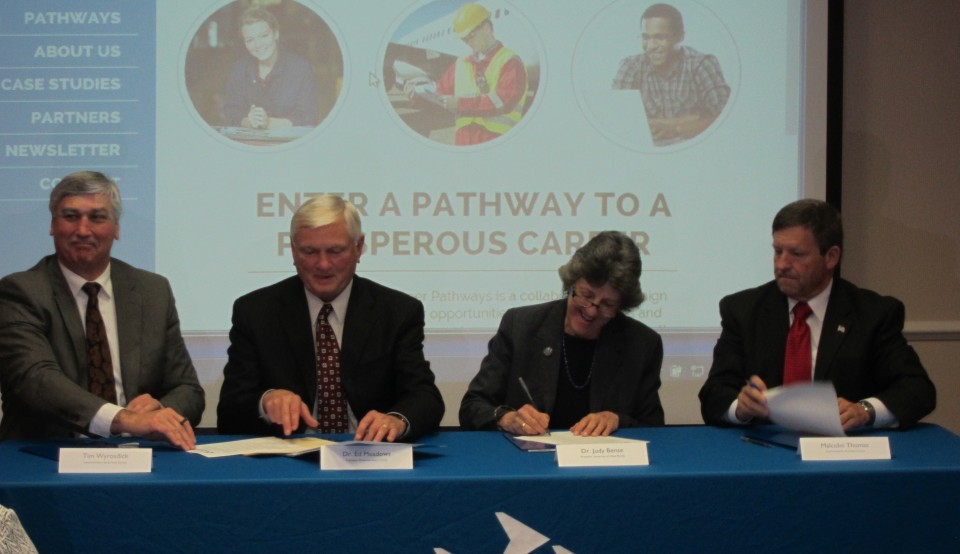Shannon's Window: Career Pathway needs to be our calling
- February 12, 2015
- / Shannon Nickinson
- / government

Judy Bense was the one who brought it home.
On Thursday, the business and educational communities got together to announce a new collaborative program called Greater Pensacola Career Pathways.
The initiative is a partnership that looks at economic development through the lens of the education system with an eye toward building a strong, educated workforce starting in middle school all the way through college.
It will be launched from this website, which will serve as a guide for students and parents, teachers and guidance counselors to give students an idea of what real jobs await them in the workforce. And what educational skills they will need to get those jobs.
It is meant to focus the broad, buzzworthy term “workforce development” into a concrete career path that a parent and student can understand. It is meant to focus the “what do I want to be when I grow up” conversation at 13, rather than at 23.
It is meant to help the local K-12 education system walk hand-in-glove with the business community to identify industries that are growing and will have job openings now and in the future.
It is meant to fill the gaps in the workforce’s skills identified last year in a labor market gap analysis conducted for the Greater Pensacola Chamber of Commerce.
Bense arrived a tad late for the start of the news conference to roll out the event, but her point was worth the wait.
When it came to her turn to talk about why the Career Pathways project is important, she went back to the days after she first became interim president at the University of West Florida in 2008.
When she was asked what her vision for the university would be.
“My real answer, from the heart, is to make it the University of West Florida, the university for West Florida,” she said. “(Because) our university is more needed than in any other region of Florida. We don’t have an Orlando, we don’t have a Miami, where billionaires flock to drop millions into their communities.
“We’re us. There is no one coming to help us. We have to help ourselves. And we’re happy to do that.”
Which is why the partnership announced Thursday needs to succeed.
The world is more competitive than it has ever been. Schools require more of third-graders than we did of sixth-graders back in the day.
Jerry Maygarden, president of the Chamber Foundation, noted that when companies consider coming to this — or any — community, the biggest question they ask is, “What’s the talent like? What are your people like?”
We need to be able to answer that question. And the answer has to be a good one.
In this world, college can’t be the place to “find yourself.” By the time our young people get to that point, they need to know if the dream job they want has a basis in reality. They need to know how that degree or certification they are pursuing will apply in real life.
“By the time they get to us, if they know what they want to do, if we can help people figure out what they want to be,” it will save them money and time, Bense said.
We need things like CyberThon 2015, organized by the business community in collaboration with the public school system to give students in the Pine Forest High School cybersecurity academy an immersive, real-world look at how what they study in class can lead to a job after graduation.
Stopping the brain drain, helping people who want to stay here earn a livable wage at work that they love, valuing the jobs that pay well and require two-year degrees and industry certifications as highly as the ones that require doctoral degrees, making it so that people can stay in the place where thousands live the way millions wish they could.
“That’s taking care of the people of West Florida,” Bense said. “We really need each other because there is no one else.”
 CivicCon launches with a look at good growth in cities
CivicCon launches with a look at good growth in cities
 Building stronger brains one baby, one parent at a time
Building stronger brains one baby, one parent at a time
 SCI debuts commercial on Early Learning City
SCI debuts commercial on Early Learning City
 Entrecon: World class speakers and an opportunity to sharpen skills
Entrecon: World class speakers and an opportunity to sharpen skills
 PYP Quality of Life survey 2017
PYP Quality of Life survey 2017
 EntreCon Pensacola 2016: A look back
EntreCon Pensacola 2016: A look back
 Leadership tip: getting better employee takeaways
Leadership tip: getting better employee takeaways
 Leadership tip: be interested instead of interesting
Leadership tip: be interested instead of interesting
 Leadership tip: delivering difficult messages
Leadership tip: delivering difficult messages
 Brain Bags boost Arc, Early Childhood Court programs
Brain Bags boost Arc, Early Childhood Court programs